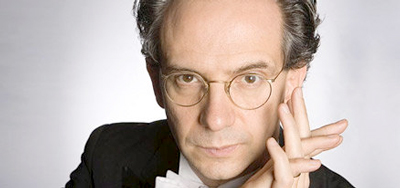by Mike Telin

We spoke with Fabio Luisi by telephone earlier this month, just before his debut with the Czech Philharmonic in the Verdi Requiem. “I’m looking forward to my return to Cleveland,” he said at the beginning of our conversation. “The orchestra played so beautifully during my debut concert two seasons ago.”
The concerts on Thursday and Saturday evenings will feature Mahler’s fourth symphony. “I have a long relationship with Mahler’s music,” he said. “It’s something that touches my heart and soul. It is something very special to me.” When asked when he first discovered Mahler, he quickly responds, “I can tell you quite precisely. I was fifteen years old in Genoa, the town of my birth. I was a student and I went to a concert with my girlfriend of that time and it was Mahler’s Symphony #5. It was such a discovery for me because I had never heard a Mahler symphony before and this huge amount of sound and the differences of moods astonished me. And from then on I was a Mahler addict.”
Mahler’s fourth symphony turns out to be one of his favorites. “All of his symphonies have something special but the 4th is very different from all of the others. Everything in Mahler is huge chamber music but the 4th is more like chamber music then the others. It’s more delicate, it’s like describing the core of so many things with such delicacy which is special. Mahler is not always delicate, he is sometimes very straight ahead. But the fourth symphony has something very special. There is so much imagery that reaches your feelings rights away but in a gentle way. The song sung by the soprano in the final movement — this is a surprise. After the third movement you don’t expect something so tiny and so delicate. It’s actually a gentle leap that is so nice and so smooth. I love it!”
The middle concert this weekend is a “Fridays @ 7” performance for which Luisi will swap out Mahler 4 for Schumann’s “Spring” Symphony. “I love that symphony very much. I see Schumann through the piano music and sometimes he is a little naive in the treatment of the orchestra. But he has such original ideas, and such refreshing things that he put in this symphony. At the same time he shows a lot of enthusiasm and a lot of will to make something new but with a freshness which I like very much.”
Schumann wasn’t originally one of Luisi’s favorite composers. “At first I didn’t care for him at all until one of my professors in high school asked me, ‘Why don’t you like Schumann? He is one of the most important composers of the romantic period, especially for the piano, but everything he wrote is at a high level.’ So I started to listen to Schumann. I was around 17 years old at the time and did it gradually. I started with the solo piano works, then the piano concerto, and little by little, the symphonies. And the first symphony came later. It was a trip into Schumann that I don’t regret. I think you need a little bit of life understanding to understand Schumann properly. Well, that was my experience.”
The Cleveland Orchestra’s “Fridays @ 7” series is an initiative designed to bring new, younger audiences into the world of the symphony orchestra through shorter concerts bookended by pre-concert performances and afterparties featuring different genres of music. Luisi applauds this approach, but suggests an additional stage is important in the process of attracting new audiences. “You need a step in between, you have to go to the new audience. In my experience they are not against classical music, they are not against orchestras, they are not afraid of them. But the problem for many people is to come to the opera house or concert hall. They feel intimidated by those venues.”
“It has been my experience that the orchestra or part of the orchestra should go into the schools, into the colleges and the factories, and [meet] the people who have never attended a concert. They should bring their music to those people and then the people will feel more motivated to make the effort to go to the concert hall. I think this is the right step in my opinion.”
Luisi recently won a 2013 Echo Klassik Award for his Met DVD recordings of Siegfreid and Götterdämmerung. We end our conversation by congratulating him and asking if he had fun working with director Robert LePage in those controversial productions of Wagner’s Ring operas featuring the famous and sometimes ill-fated “machine?” “Yes I did,” he said. “He’s a great director. He is someone who is used to being part of a team so he needs associates, he needs friends, he needs allies for developing his ideas. But visually he is a genius.”
Published on ClevelandClassical.com September 16, 2013
Click here for a printable version of this article.



